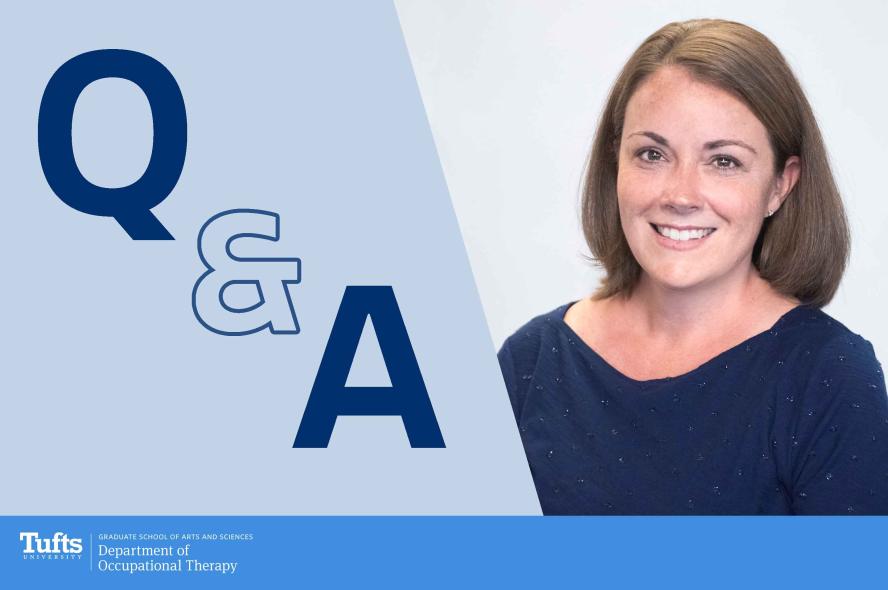Q&A: Fieldwork Education with Lecturer Ryan Whitney, OTD ‘19

By: Maisie O'Brien
- What is your professional background? Describe your role as the academic fieldwork coordinator at Tufts.
I’m a proud “triple Jumbo” (meaning I have three degrees from Tufts)! I started out my career by earning a BS in biology from UMass Amherst and an MA in child development from Tufts. I worked in early intervention services and loved what occupational therapists were doing in the space, so I returned to Tufts and earned an MS in occupational therapy. After working as an OT in complex medical pediatrics for a decade, I returned to Tufts again and earned my PP-OTD in February 2019. I joined the faculty part-time in 2018.
My title is Academic Fieldwork Coordinator and I’m also a full-time Lecturer. I teach the introductory pediatrics course called Occupation and Adaptation of the Child and Adolescent. I also co-teach Fieldwork Seminars I and II with Lecturer Meredith Grinnell. Additionally, I serve as faculty mentor for a variety of doctoral capstone projects.
As academic fieldwork coordinator, I’m responsible for overseeing the breadth of our occupational therapy fieldwork program, including adherence to accreditation standards. I do most of the networking and liaising with our community sites. It’s a huge component of my job and one I value greatly. It’s my personal goal to further Tufts’ commitment to civic engagement and make sure our community partnerships are not only educational for our students, but mutually beneficial. We really want to ensure our students are bringing the knowledge and experience necessary to support their placement sites.
- Describe fieldwork education at Tufts.
Fieldworks are experiential learning opportunities where students gain experience and knowledge through direct observation and participation, with supervision by licensed occupational therapists.
Fieldwork takes place in a variety of settings, including medical placements, mental health placements, community-based placements, and school-based placements. We’ve also placed students in less common, emerging-practice occupational therapy settings, like post-incarceration reintegration programs and immigration and resettlement organizations. I’m always open to exploring the feasibility of building relationships with new placement sites, if a student wants to work with an organization we’re not currently partnering with.
Tufts entry-level OTD students participate in level I and level II fieldwork experiences. Level I placements are integrated into students’ courses and completed as part of their classroom learning. During a pediatrics class, for example, a student will go into the community and spend 16 hours in a pediatric setting observing and engaging in some limited participation. Meredith Grinnell is the Level I Fieldwork Coordinator.
As the Academic Fieldwork Coordinator, I oversee level II fieldwork placements as well as the fieldwork program as a whole. Level II fieldworks consist of two full-time, 12-week placements that take place during students’ third and final year. In these longer placements, students gradually progress from assuming the role of a student to the role of an entry-level OT, while receiving continuous support, feedback, and mentoring from their fieldwork educator. Throughout level II fieldwork, I serve in an advising capacity for students and their placement sites. I’m always available to celebrate student successes and provide support through any challenges that may arise.
3. What makes the Tufts fieldwork program special or unique?
There are different models for placing students in fieldwork settings, and I believe that ours stands out in terms of our student-centered, individualized approach. First, students benefit from having a dedicated point person supporting them throughout their fieldwork experiences. As a lecturer in the fall semester of our students’ first year, I get to know them as learners and people, which helps when it comes time to match them to their level II fieldwork placements.
My aim in matching students is to create a supportive space where they can explore their strengths, areas for growth, and goals for experiential learning. This is often a collaborative process with the students’ academic advisors. Students have the opportunity to rank areas of practice that are interesting to them, and then we work to identify two level II fieldwork placements in distinctly different areas of practice. I will encourage a student who enters the program saying “I only want to work in pediatrics” to branch out and consider what other experiences might support them in becoming a well-rounded entry-level practitioner who plans to work in pediatrics. I’m not trying to change their career goals, but I try to expand their perspective a bit.
As a long-established program, many of our fieldwork partners have a deep history of working with Tufts OT. Our placement sites consistently tell us how well prepared Tufts students are and I have to agree: they’re amazing! Another compliment I often hear is that our students know how to think like OTs. Tufts is known for its clinical reasoning curriculum and it shows in our fieldwork. Even if our students encounter a situation that you can’t directly teach in a classroom, we instruct them how to reason through what to do. They’re ready for fieldwork in a comprehensive, general sense. Our students do very, very well in their fieldwork placements, board exams, and years of early practice.